Banking is an essential part of modern financial life. Whether you want a checking account for your day-to-day transactions or a savings account to grow your money, opening a bank account is usually the first step. However, banks have specific requirements to open an account that you'll need to fulfill to get started. Being prepared with the proper paperwork can make account opening hassle-free.
What Documents Do You Need to Open a Bank Account?
Opening a bank account requires certain documents to verify your identity, including your address and Social Security Number. You might also need to provide an initial deposit of between $25 and $100.
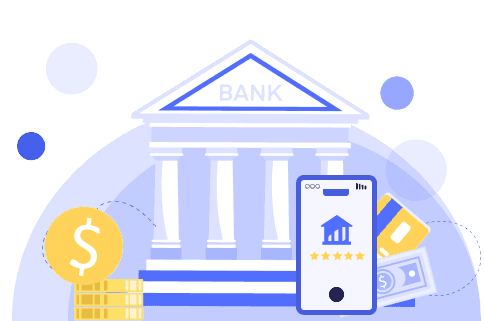
Updated: October 28, 2024
Advertising & Editorial Disclosure
Key Takeaways
Most banks require specific documents to verify your identity and address. You may also need an initial deposit to open an account.
Valid identification documents can include a driver's license or state-issued ID card, U.S. passport or passport card, permanent resident card, Military ID or foreign passport (for non-U.S. citizens).
Commonly accepted documents for proof of address include a recent utility bill, lease agreement or mortgage statement.
Types of Documents You Need
Opening a new bank account requires providing certain documents to verify your identity and address. Most banks require government-issued photo identification, like a driver's license or passport. You'll also need to show proof of your residential address through documents like utility bills or lease agreements. Other common requirements include your Social Security number (or individual taxpayer ID for non-residents) and a minimum opening deposit.
Being prepared with the proper documentation streamlines the account opening process.
Document Type | Typical Documents Required |
|---|---|
| |
| |
| |
| |
|
Identification Documents
One of the primary requirements to open a bank account is providing valid documents that prove your identity. Acceptable forms of ID typically include:
- Driver's license or state-issued ID card
- U.S. passport or passport card
- Permanent resident card (Green card)
- Military ID
- Foreign passport (for non-U.S. citizens)
Banks use these documents to verify your full legal name, date of birth and physical description. These help banks comply with anti-money laundering laws like the Bank Secrecy Act and the Patriot Act. Here are a few examples of what these documents look like:
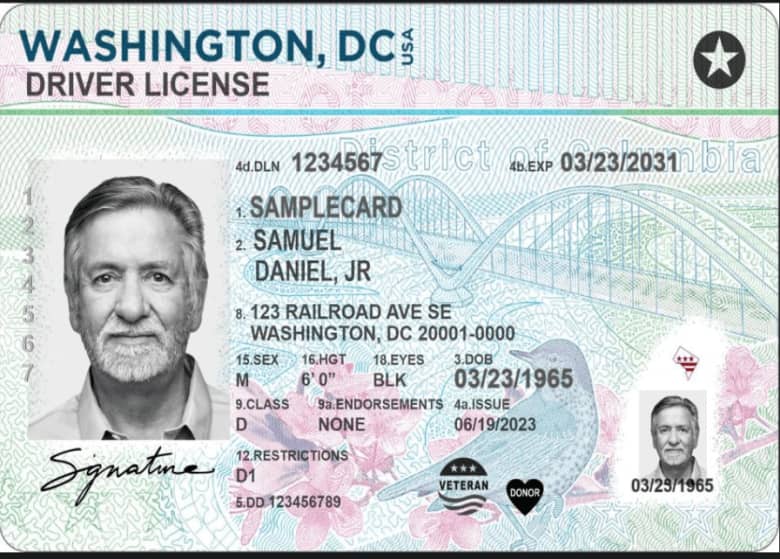
Example of a driver license (http://dmv.dc.gov/service/dc-dmv-real-id-driver-license)
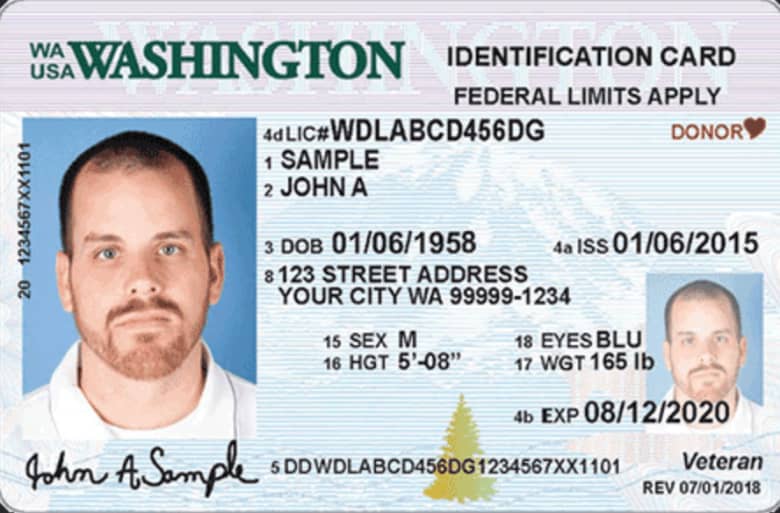
Example of state-issued ID card (https://dol.wa.gov/id-cards/id-card-designs)
If your ID has expired or will expire soon, consider renewing it before applying for a new bank account to avoid delays or rejection of your application.
Proof of Address
In addition to identification, banks typically require proof of your residential address. Commonly accepted documents include:
- Recent utility bill (e.g., electricity, gas, water, cable/internet)
- Lease agreement or mortgage statement
- Vehicle registration or insurance card
- Payroll or government-issued document with your address
The address on these documents must match the one you provide when opening the account. If you've recently moved, update your address with the appropriate agencies before applying.
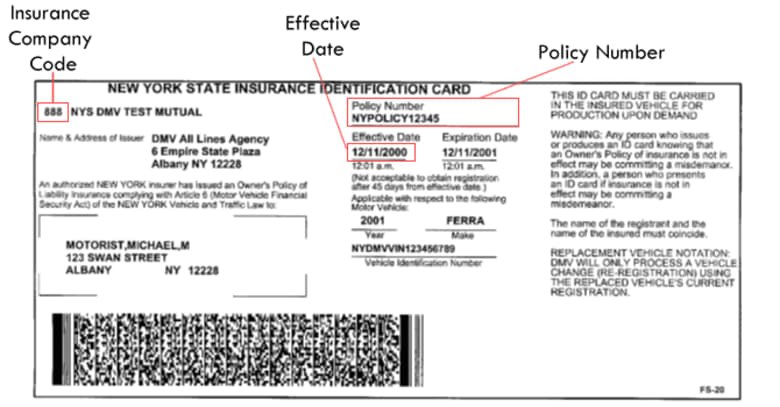
Example of vehicle insurance card from the New York State DMV (https://dmv.ny.gov/insurance/sample-insurance-id-card-fs-20)
Social Security Number (SSN) or Taxpayer ID
Banks ask for your Social Security number (SSN) when opening an account for U.S. citizens and residents. This nine-digit number, issued by the Social Security Administration, helps banks identify you for tax reporting purposes.
Non-U.S. residents may need to provide a taxpayer identification number, such as an Individual Taxpayer Identification Number (ITIN) or foreign tax ID instead.
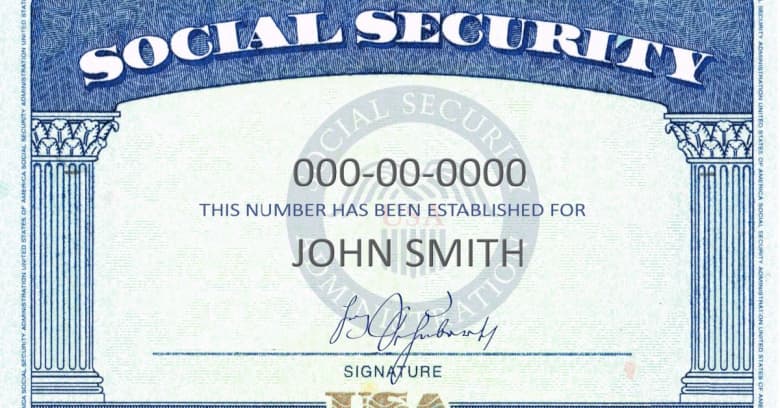
Example of U.S. Social Security card
Initial Deposit to Open a Bank Account
Most banks and credit unions require you to make an initial deposit when opening a new checking or savings account. This minimum opening deposit amount can vary significantly between institutions. Typical requirements range from $25 to $100 or more at many brick-and-mortar banks. Online banks often have lower or no minimum deposit requirements to attract customers.
The deposit amount required can also depend on the type of account you’re opening. Basic savings accounts tend to have lower minimums than premium checking accounts with more features.
Documents Needed to Open a Bank Account for a Child
If you're opening a bank account for a minor, you'll typically need to provide:
- The child's birth certificate or Social Security card to verify their identity
- Your own valid ID and proof of address
- Minimum deposit (if required)
As the parent or legal guardian, you'll have ownership and control over the account until your child reaches the "age of majority," which is 18 or 21 in most states.
Additional Documents for Specific Situations
In some cases, banks may request additional documentation depending on your circumstances:
- If you're a non-resident alien, you may need a valid passport or visa and proof of income or employment authorization.
- Usually, sole proprietors and business owners opening a business account need an Employer Identification Number (EIN) and business registration documents.
- Trust accounts require paperwork showing the trust agreement, names of trustees and beneficiaries and their identification.
You can always contact the bank ahead of time to determine what documents you need to present for your situation.
Here are steps you can take to make opening a bank account fast and easy:
- Gather all required documents beforehand to avoid multiple trips to the bank.
- Call the bank or check their website to confirm the requirements.
- Consider opening an account online if you prefer convenience over visiting a branch.
- Be prepared to answer questions about your income, employment and the intended use of the account.
- Understand the bank's fees, minimum balance requirements and other policies before signing up.
FAQ About the Documents Needed to Open a Bank Account
Understanding the required documents to open a bank account can simplify the process. We answer some of the most common questions about the required documents.
What documents do you need to open a bank account?
To open a bank account, you typically need to provide the following documents:
- Valid ID, such as a driver's license, passport or state ID
- Proof of address, which can be a utility bill, lease agreement or a bank statement with your current address
- Additional documentation specific to your situation, such as a Social Security card or proof of employment
What documents do you need to open a bank account for your child?
When opening a bank account for a minor, you'll typically need to provide:
- The child's birth certificate or Social Security card to verify their identity
- Your own valid ID and proof of address
- Minimum deposit (if required)
Can you get a bank account if you're not a U.S. citizen?
Yes, non-U.S. citizens can generally open bank accounts. You'll usually need to provide a valid passport, visa and proof of income or employment authorization. Some banks may have specific accounts tailored to non-resident aliens, so it's best to inquire about their requirements and offerings.
How many steps are involved in opening a bank account?
Typically, the process involves four steps: providing personal information, submitting required documents, funding the account and verifying your identity. The number of steps can vary depending on the financial institution and whether you're opening the account in person or online.
What’s an acceptable form of ID to use to open a bank account?
Acceptable forms of ID to open a bank account include a driver's license, passport, state ID or other government-issued photo identification. Non-U.S. citizens may be required to provide a valid passport and visa as their primary forms of identification.
Do you have to show proof of address to open a bank account?
Yes, most banks require proof of address to open a bank account. Acceptable documents for proof of address include a utility bill, lease agreement or a bank statement with your current address.
Can you open a bank account without proof of ID?
No — all banks require a valid form of identification to open a bank account.
How long does it take to open a bank account?
In-person account openings may be completed on the same day, while you can often open online accounts within minutes. Factors such as document verification and initial deposit may also impact the timeline.
Can you open a bank account without a Social Security number?
If you're a non-U.S. citizen or resident, you may be able to open a bank account with alternative identification, such as a passport or taxpayer ID number, instead of an SSN. Requirements vary by bank.
Is a minimum deposit always required to open a bank account?
Not necessarily. While many banks have minimum opening deposit requirements, some online banks and local credit unions may allow you to open an account with a $0 initial deposit.
About Alvin Yam, CFP

Alvin Yam is a certified financial planner (CFP) with over 15 years of experience working with individuals and corporations. Before founding Paraiba Wealth Management, he was a director at HSBC and a financial consultant at Charles Schwab. Yam is MoneyGeek's expert consultant on wealth management and personal banking.
Yam earned his bachelor's degree in political science from the University of California, San Diego, and his Master of Business Administration from Loyola Marymount University.
sources
- New York State Department of Motor Vehicles. "Sample NY State Insurance ID Cards." Accessed October 28, 2024.
- Washington State Department of Licensing. "Examples of ID cards." Accessed October 28, 2024.
The content on this page is accurate as of the posting/last updated date; however, some of the rates mentioned may have changed. We recommend visiting the lender's website for the most up-to-date information available.
Editorial Disclosure: Opinions, reviews, analyses and recommendations are the author’s alone and have not been reviewed, endorsed or approved by any bank, lender or other entity. Learn more about
our editorial policies and expert editorial team.
